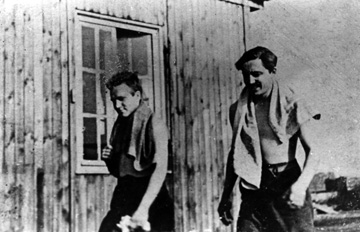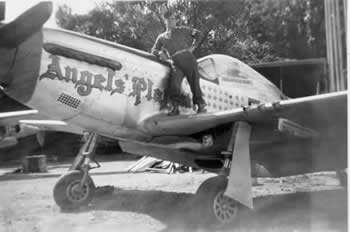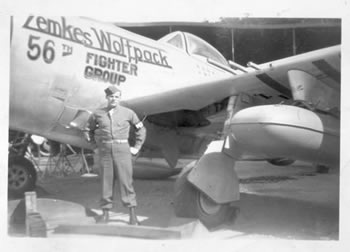|
Story of WW II Shoot Down and POW Experiences |
||||||||
 |
 |
|||||||
|
Regaining the Gifts of Freedom The daily news reports were more encouraging than ever as time moved into March and the weather was helping by being warmer. The Red Cross parcels were in short supply as again the German transporation system was being hit hard. The Red Cross convoy was made up of American vehicles, American prisoners of war and the Swiss officials of the Red Cross. With the arrival of the Red Cross parcels, Joe and I decided to make a cake for Easter, April 1, 1945. The cake was made from scraps of German brot (bread), two spoons of margarine, twenty de-seeded prunes, three spoons of Jerrie sugar, powdered milk, three squares of chocolate D bar and six bicarbonate pills. We baked it in the bottom of the stove for four hours, slow so as not to burn. When we finished we made an icing — it sure tasted good. |
||||||||
| After Easter, April 1, 1945, kriegie (Kriegsgefangen - prisoner of war) life was going very well and with warm sunny days it made us all feel better. The boxer, Max Schmeling, visited that day. Joe went to see him and stated he was a big joker. When we woke very early on April 4, the mess hall was on fire. |
||||||||
 |
||||||||
|
|
||||||||
|
The guards would not let us out to try to fight it until more guards were posted. The German fire fighters arrived and it was like The Three Stooges putting out a match. By the time the kriegies were let out to help it was gone and nothing to save. So, after this, our food had to be cooked by individuals. Joe and I drew our rations together which made it much easier to divide whatever we received and we cooked the same way, either taking turns or together.
Extra Red Cross parcels were given out and on April 23 we received our first Canadian parcel and another on April 27. We knew from radio reports and the action by the guards our release should come soon. With the extra rations and no need to make it last, one did not hear the tune of our belly button playing Yankee Doodle on our backbone. 

Ellsworth R. Brown was an MP in the AAC attached to Zemke's Wolfpack while in England; he served at several bases while there. This is him standing on the wing of Bruce Carr's plane. It shows the "kills" plainly, as well as Carr's name. He served with the 56th FG while in England, traveling on the QE with thousands of troups, and staying until the "Liberation" when he went to Paris. He received the Victory medal and came home on the Queen Mary. He was turned down for service initially as he had a deformed hand; but in 1942 after several tries to sign up, they finally took him in. We awoke on April 30, 1945 with demolition charges going off and went outside to see what was happening. The message came down to dig foxholes as the Russians were not that far away and the Germans could use the camp as a fortification. This was satisfied when the guards left and the camp was turned over to the senior American officer, Col. Zemke, at 2300 hours. The next day, May 1, many were up early, if they did go to bed, and the fences were pulled down. The Russians arrived and with them came a heard of cattle, most were good milk cows. With the number of farm boys around, the cows could not keep up with the milking. We also had a huge barbecue as a whole steer was put on a spit and we used the posts from the fence as fuel. Everyone helped so no one person did it all. It sure was good. After the guards left there were no hours to be concerned with, the weather was good, sunny and dry, and we had plenty to eat so now came the question as to when we would be back in American hands. The staff of Col. Zemke needed a typist, so I volunteered. Like I told Joe, I need to be in the head shed to find out what is going on. After a few tries, I mastered the German typewriter and was getting out the messages to the compound commanders. The office was informed that there were American Red Cross parcels being looted by the Germans, so the complete staff, leaving only the executive officer, headed to the barracks for help. We started a chain to retrieve the parcels and get them to the troops as we sure needed the additional food. The word was out to stick together for safety in numbers but some did not and some started out but by the next day returned. Then the roof fell in. The Russian commander on his arrival issued the order to vacate the camp and prepare to march in six hours. Col. Zemke called all staff together and said to prepare accordingly and he would see what he could do and that he would stay in contact with the office. I returned to the barracks where Joe and I prepared for whatever was to come. We sewed a shirt to make a backpack and filled it with canned food, etc. Everyone was pretty morbid. How could our Russian allies do this to us? Not much was said as everyone prepared on their own. I believe some did not do anything to prepare and would take it as it came. About an hour before we were to start the march I returned to headquarters, but the Colonel had not returned from trying to get this order recinded. When he finally returned later, the march order was rescinded, but we knew then that the Russians were now in charge and we would not know what might happen next. After the arrival of the Russian commanding general and the conferences — held by the Russian-American-British staffs — it was decided to heed General Eisenhower’s message to all POWs, “Stand by for evacuation by air”. The Russian commander placed the city of Barth off limits which kept the traffic to town at a minimum. Joe and I made several trips into Barth because through our work on the staff we had a pass signed by Col. Zemke and the Russian commander, if we were stopped. But, no Ruski bothered. The front line troops that occupied Barth were very ruthless with the Germans and those Russians carried a sub-machine gun at point and drank vodka like water. Most of these front liners were Russians on who the Germans had used the scorched earth tactics and had annihilated their people. So, no mercy was given to the Germans. Time was long waiting for our evacuation. The Russian commander had an entertainment troop give there presentation to us the same as to their troops. It was our equivalent of the American USO shows. The day of departure arrived. On May 13, 1945, the word was passed and we were up early and ready to march to the airport for that flight to freedom. The planes were B-17s, B-24s, C-47s and as soon as they landed, the group assigned to that aircraft were boarded without shutdown and ready for take-off. We were a very elated group of now Ex-Pows as soon as that airplane lifted off the runway and headed west. End of Chapter 10 Go to Cover — Introduction — Table of Contents Chapter — 1 — 2 — 3 — 4 — 5 — 6 — 7 — 8 — 9 — 10 — 11 — 12 — 13 Or Go To Home - Contact Us - Cold War Hist. - 91st SRS Hist. - Stardust 40 Mission Story |
||||||||